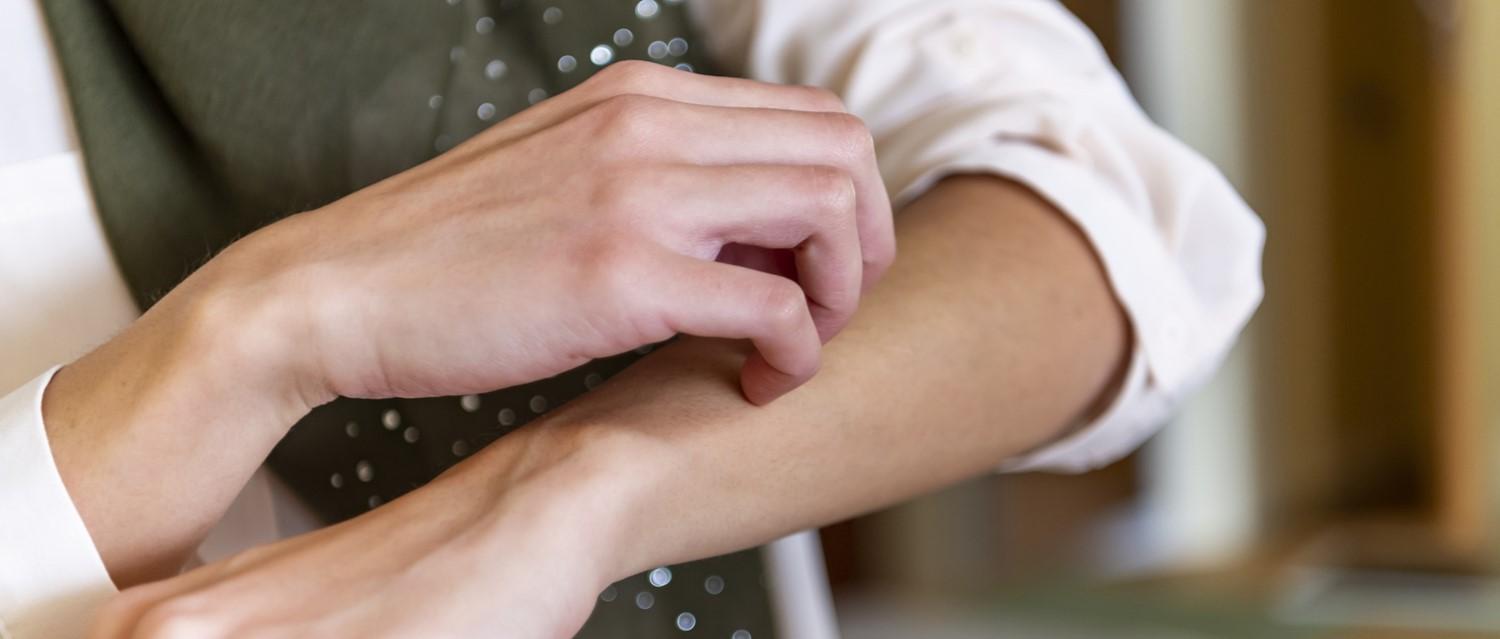
Quelles sont les causes de l'eczéma soudain chez l'adulte ?
Peer reviewed by Dr Krishna Vakharia, MRCGPLast updated by Lydia SmithLast updated 11 May 2023
- TéléchargerTélécharger
- Partager
A flare-up of eczema can be caused by any number of things, from using washing-up liquid to being exposed to cold air. However, it can be difficult to pinpoint what has triggered a sudden bout of eczema and caused your skin to become red, itchy or sore.
Dans cet article :
Poursuivre la lecture ci-dessous
What is eczema and what causes it?
Eczema is a non-contagious, inflammatory skin condition. The most common form, atopic eczema, affects one in five children and one in 10 adults in the UK1. It causes the skin to become itchy, dry and cracked and can be painful and uncomfortable. Alongside the physical symptoms, a flare-up of eczema can lead to a whole host of other problems too, including insomnia, anxiety and depression.
Atopic eczema is often caused by a combination of things, including genetics. You may be born with a higher chance of developing eczema if other family members have the condition. Being prone to eczema may make your skin more likely to react to certain triggers, such as cold weather, skin products, foods and hormonal changes, among others.
Dr Derrick Phillips, a consultant dermatologist and British Skin Foundation spokesperson, says it isn’t always possible to identify a trigger for a sudden flare-up of eczema, which can appear unexpectedly. "However, stress, infections, sweating, changes in the weather, chemicals - such as chlorine - and allergies can all aggravate eczema," he says.
Sélection de patients pour L'eczéma

Santé de la peau, des ongles et des cheveux
Tout ce qu'il faut savoir sur l'eczéma du bébé
Les bébés présentent toutes sortes d'éruptions cutanées et d'affections de la peau, de l'érythème fessier aux croûtes de lait. La plupart sont inoffensives et disparaissent avec le temps grâce à des soins appropriés, mais l'eczéma peut être un problème persistant. Qu'est-ce que l'eczéma du bébé et comment le traiter ?
par Lydia Smith

Santé de la peau, des ongles et des cheveux
Eczéma atopique
L'eczéma est parfois appelé dermatite, ce qui signifie inflammation de la peau. Il existe différents types d'eczéma, mais la plupart sont des affections chroniques. Le type le plus courant est l'eczéma atopique. Dans ce type d'eczéma, il existe un schéma typique d'inflammation de la peau qui provoque les symptômes. Les crèmes hydratantes (émollients) et les crèmes ou pommades à base de stéroïdes sont les traitements les plus courants. Environ 2 enfants sur 3 atteints d'eczéma atopique en sortent vers la mi-adolescence.
par le Dr Doug McKechnie, MRCGP
Stress and eczema
When we get stressed, our body has a physiological reaction called the 'fight or flight' response. This was originally a survival mechanism triggered when we faced a life-threatening situation such as a predator, but now, the same response is activated by everyday stresses like work.
During this response, stress hormones like cortisol are released which allow us to react quickly. However, if you are frequently stressed, or feel stressed for long periods of time, cortisol suppresses the immune system and increases inflammation throughout the body - which can trigger or worsen eczema2.
Poursuivre la lecture ci-dessous
Environmental triggers
Environmental factors or allergens such as cold and dry weather, strong sunlight, and dampness can also trigger an eczema flare-up or make symptoms worse. Sometimes, a sudden eczema flare-up can occur if you’ve been exposed to certain allergens, such as dust mites, pet hair, pollen or mould.
Hormones and eczema
Research suggests hormones affect a type of immune cell called Th2, which has been linked to eczema3. Hormones, including oestrogen, progesterone and testosterone can interact with this cell. Therefore, as your levels of these hormones change - for example, in pregnancy or during your period - you may experience changes in eczema symptoms.
Poursuivre la lecture ci-dessous
Chemicals
Even if you’re careful about what you use on your skin, certain chemicals - including in cosmetics and personal care products - can trigger eczema. Air pollutants are also known to worsen eczema symptoms. These can be found in areas of traffic or from heating systems in buildings, which can make them difficult to avoid4.
What are the treatment options for eczema?
"If you experience a sudden flare of adult eczema, arrange to see your doctor or dermatologist," says Phillips. "You may require treatment with topical steroids, which come in different strengths according to the severity of the flare and where it is on the body. In general, steroid ointments are more potent than steroid creams or lotions. They work by soothing the skin, calming inflammation and reducing the itch," he says.
"For sensitive areas such as the face, steroid-sparing creams are recommended - topical medicines which contain fewer side effects than steroid creams. These treatments provide the benefits of steroids without side effects such as thinning of the skin."
Mild flares of eczema may be managed with moisturisers and soap substitutes alone, Phillips says. "While the skin is inflamed, avoid potentially irritating preparations, and opt for products that are fragrance and preservative free," he adds.
Moisturisers also play a key role in managing eczema. "I recommend using ointments at night. They are greasy and may be cosmetically unacceptable for daytime use - as they can feel uncomfortable and stick to clothing, but they are extremely effective at repairing the skincare barrier and locking in moisture overnight. I recommend creams for daytime use. They have a higher water content and are more rapidly absorbed, requiring several applications throughout the day."
For recurrent flares of eczema, Phillips says treatments such as light therapy - the use of ultraviolet light - may be recommended. UV light appears to reduce the number of cells involved in the inflammatory response, which plays an important role in eczema. Reducing the number of these cells may improve symptoms of eczema. This is not the UV light found in sunbeds - which are still not recommended for their higher skin cancer risk, but the treatment offered by specialist hospitals with more controlled UV light.
Antibiotics may be required if there are signs of infection, such as a gold crust, redness, or yellow fluid around the affected area. If the skin is infected, it may also be hot and sore. If you feel your eczema is infected - you must be seen by a doctor.
Pour en savoir plus
Historique de l'article
Les informations contenues dans cette page ont été évaluées par des cliniciens qualifiés.
11 mai 2023 | Dernière version
11 May 2023 | Originally published

Demandez, partagez, connectez-vous.
Parcourez les discussions, posez des questions et partagez vos expériences sur des centaines de sujets liés à la santé.

Vous ne vous sentez pas bien ?
Évaluez gratuitement vos symptômes en ligne